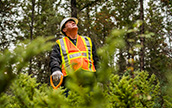Workforce engagement
The Board recognises merit in the Code’s three mechanisms for engaging with the workforce. As with all the Code’s provisions, boards must consider the size and structure of their business, including its international scope, and select an approach that most practically delivers the underlying spirit and ambition of the Code, even if the chosen approach differs from what the Code outlines. The Code does note that alternative methods for workforce engagement are supported where an explanation is provided.
The Code states that its use of the term “workforce” is not meant to align with legal definitions of workforce, employee, worker or similar terms. But for a global organisation bound by the laws of more than 70 countries, blurring the clearly prescribed legal definitions that affect complex issues (such as local health, safety, security and environment (HSSE) requirements, work contract terms, legal accountability, employment rights) or merging two definitions of the same term could have a notable impact on the business, its operations and its stakeholder relationships (including with suppliers). As a result, Shell considers its workforce to be employees of companies in the Shell Group. The Board also engages with others outside this group (for example, on site visits), and some of this engagement is shared in section "Understanding and engaging with our stakeholders".
Although our reporting and formal engagement focuses predominantly on our employees, all individuals working on Shell sites (including Shell offices) are required to undertake certain Shell training (for example, on matters relating to HSSE and the Code of Conduct). Adhering to the Life-Saving Rules and the Code of Conduct compliance obligations is included within our contracts with suppliers. The Shell Global Helpline is available for all workers to report matters of concern.
For many years, Shell has recognised the importance of engaging with its workforce. Engagement is especially important in maintaining strong business delivery in volatile times of change. We strive to maintain a dialogue between management and our workforce – both directly and where appropriate, through employee representative bodies. Management regularly engages with the workforce through a range of formal and informal channels, including via webcasts and emails from the Chief Executive Officer (CEO) and other senior executives, webcasts, town halls, team meetings, face-to-face gatherings (pre-COVID-19), interviews with Senior Management and online publications via our intranet.
The Board considers effective engagement a key element of its understanding of the Company’s ability to create value, because it recognises that our people are our greatest asset. Workforce views can help inform the Board on matters such as operational effectiveness, Shell culture, diversity, equity and inclusion, identifying risk and developing and delivering strategy.
Throughout 2021, the COVID-19 pandemic impacted how the Board engaged with the workforce. In most countries, employees were largely working from home in accordance with government rules and guidance, except for those operating vital assets. Face-to-face engagements could not be pursued because of travel bans. Board members did undertake virtual engagements, often around the time of scheduled Board discussions. Feedback from these video calls was shared with and discussed by the wider Board. Management also engaged extensively throughout the year, implementing a number of focused events to better understand how people were coping with the working environment caused by the COVID-19 pandemic, their mental well-being and what the business could do to better support them. In February 2021, the first strategy day for staff was held to engage on the new Powering Progress strategy. Engagement sessions were held on the strategic scenarios, the carbon reduction elements, and the Growth, Transition and Upstream pillars of our strategy. Management held several engagements on Reshape, the restructuring of our organisation. Reshape is focused on how we are organised (organisational structure), how we work (mindset and behaviours) and who we are (identity), underpinned by our values. At the end of 2021, several webcasts and walk-in sessions were held to engage with the workforce on the simplification for the future, including Shell’s move of official headquarters and tax residence, and its name change from Royal Dutch Shell plc to Shell plc. Information from these discussions was regularly provided to the Board.
The Board considers the current workforce engagement approach effective. The information provided in the following table gives examples of various methods of Board engagement.
Board’s Direct Engagements with the Workforce
(Because of COVID-19 restrictions in various countries, the engagement activities have mostly been held virtually.)
Virtual informal engagement – Board
Nomination and Succession Committee members meet with various senior leaders and high-potential individuals throughout the year. The Nomination and Succession Committee also received a detailed briefing alongside that given to the full Board on the results of the annual Shell People Survey, which was completed by around 83% of employees.
Off-site visits
Because of COVID-19 restrictions, site visits were limited in 2021. Although in some instances we were able to organise virtual visits and meetings, priority was given to running the business operations.
People engagements during Board and/or meetings off-sites.
Meeting talent/leadership teams.
Company Chair engaging with various individuals.
Through these more formal engagements, the Chair and other Non-executive Directors (either individually or with their committees) have deepened their understanding of how the Company’s purpose, strategy and values are embedded in particular businesses, sites and countries. This gives insight into progress made, risks and opportunities. The benefits are mutual. The Board obtains direct insight into local business operations and projects, and local strengths and challenges. Our people have a chance to better understand the Board and to provide direct feedback on topics of importance to them, their business or function and their location.
Employee network and related sessions
Conducted by Directors with, for example, Directors engaging with Shell’s lesbian, gay, bisexual and transgender (LGBT+) networks. In 2021, engagement took place with the Board and representatives from the LGBT+ network. There were discussions about the challenges facing the LGBT+ community and what type of support they could receive so everyone in Shell could perform at their best. Various members of the Board joined these discussions.
Directors involved in these engagements noted the opportunity to enrich their understanding of the LGBT+ perspective within Shell, so they had better insights into the challenges and the employee experience in this area.
Formal Reports and Information Updates to the Board
Shell People Survey (anonymous survey facilitated externally)
The Board was provided with an update on the outcomes and employee engagement levels and the quality and resilience of leadership across Shell’s workforce. As well as a broad range of subjects, the Board was informed of principal metrics, with particular focus on rewards, working conditions/workload and reputation. A more in-depth review and discussion is scheduled for early 2022.
The Board considers the Shell People Survey to be one of its principal tools for measuring employee engagement, motivation, affiliation and commitment to Shell. It provides insights into employee views and has a consistently high response rate. In 2021 the response rate was 83%, which remains high. The average employee engagement score was 75 points out of 100. This is a decrease of three points compared with 2020 but still reflects resilience of our people in a year of change. The Board also considers this engagement to understand, for example, how Shell is using the survey outcomes in: i) data analytics, for example, to identify potential correlative relationships between employee engagement and safety or ethics and compliance incidents; and ii) strengthening Company culture and values.
Senior Succession and Resourcing Review
The annual Senior Succession and Resourcing Review focused on the strength of senior leadership and plans for its development and succession, while highlighting the breadth, depth and diversity of its pipeline, the developing profile of the leadership cadre, and recruitment and attrition levels.
The Nomination and Succession Committee noted the effectiveness of succession planning, the impact of its associated execution, and the professional, data-driven, integrated approach to leadership and leadership development. It welcomed the continued focus on performance management, proactive management of Shell’s talent pipeline, and the focus on advancing Shell’s diversity agenda with increased attention on gender, race, LGBT+ and disabilities. This year’s insights provided a deeper understanding of the interplay between culture, identity, leadership talent and employee engagement across Shell.
Assessment of key trends and material incidents
Presented by Chief Ethics and Compliance Officer. This is based on the established channels for staff and others to file complaints or report on suspected breaches in relation to the Shell General Business Principles (SGBP), the Code of Conduct or any breaches of law or regulations, including accounting control and auditing concerns.
The update covers Shell employees and our wider stakeholder base. The Board (also via the Audit Committee and SESCo) obtains insight into incidents and reporting levels and remediation. These provide indicators of conduct risks and, together with the related Board reports noted below, suggest the strength of embedding and awareness of the Code of Conduct and SGBP obligations and employees’ comfort levels in raising incidents.
Risks
The Board reviews reports on strategic risks annually, and considers reports on operational risks twice a year. These reports assess current business activities against risk appetite.
Organisational culture
As part of the Reshape restructuring, the Board has been discussing the Powering Progress strategy, including powering lives. The Board also focused on diversity, equity and inclusion commitments and the launch of new organisation after Reshape. There was also engagement on the safety refresh, with the launch of the alignment with the International Association of Oil and Gas Producers (IOGP) life-saving rules. There were also discussions on psychological safety, to further improve the learner mindset and our organisational culture.
The Audit Committee also reviewed the Conduct and Culture Risk Report, which included a refreshed dashboard of risk appetite measures aligned with Shell’s core values of honesty, integrity and respect for people. Elements measured by the dashboard include: the number of terminations as a result of formally investigated Code of Conduct violations; the number of overdues on mandatory Ethics and Compliance training; anonymous reporting rates on our Global Helpline; and a selection of Shell People Survey scores. Qualitative assessments of insider threats and our approach to caring for our people were also covered.
Chief Ethics and Compliance Officer Report
Data and insights include information from the Global Helpline, the Shell Ethics and Compliance organisation and the Shell People Survey. SESCo continues to strongly support the work of the Chief Ethics and Compliance Officer, including the efforts to ensure a safe working environment where staff feel confident to raise any concerns in good faith.
The Audit Committee is kept updated when matters highlighted through the Global Helpline are investigated. The Audit Committee is also informed about the associated remediation. For more information see the Audit Committee Report.
Assurance activities
Assurance activities, including items raised by businesses and functions (through the Group Assurance Letters process) and assurance (from Internal Audit, HSSE, Ethics and Compliance, Reserves Assurance and Reporting), provide additional evidence to the Board of the commitment to high standards of risk management and internal control. The assurance activities ensure that work can be done safely, within regulatory frameworks.
The information provided within these reports further supports the Board’s annual review of the effectiveness of the Group’s system of risk management and internal control and feeds into the Group scorecard, against which staff bonuses are calculated.
The Shell Control Framework
Significant HSSE, Ethics and Compliance, and more broadly, business control incidents are brought to the attention of Senior Management and the Board through regular reporting.
The Board discussed how the organisation could learn more from incidents and how the business could drive safety performance. The Board shared and discussed examples based on personal experience of how to promote a strong safety culture.









